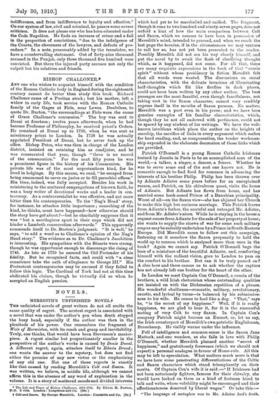BISHOP CHALLONER.*
Ore one who wishes to acquaint himself .with the, condition of the Roman Catholic body in England during the eighteenth century cannot do better than study this book. Richard Challoner came of a Puritan stock ; but his mother, left a widow in early life, took service with the Roman Catholic family of the Gages at Firle, near Lewes. Doubtless, to quote Dr. Burton, "the surroundings at Firle were the cause of Grace Challoner's conversion." The boy was sent to Douai at fourteen ; twelve years afterwards, when he had become Professor of Philosophy, he received priest's Orders. He remained at Douai up to 1730, when he was sent as missionary priest to London. In 1738 he was actually appointed President of Douai, but he never took up the office. Bishop Petre, who was then in charge of the London district, insisted on retaining him as coadjutor, and he was consecrated that year, though "there is no record of the consecration." For the next fifty years he was a prominent figure in the history of his Communion. His private life was of the most unpretentious kind, for he lived in lodgings. By this means, we read, "he escaped from being summoned to serve on juries or to fill parochial offices." His time, indeed, was fully occupied. Besides his work in ministering to the scattered congregations of his own faith, he was a busy writer of devotional works and a leader in con- troversy. As a controversialist he was effective, and not more bitter than his contemporaries. To the Nag's Head' story, for instance, he attaches little importance ; something of the kind, he thinks, must have happened—how otherwise should the story have got about ?—but he charitably supposes that it was " but a sacrilegious sport in their cups which did not hinder a Lambeth consecration afterwards." This apparently commends itself to Dr. Burton's judgment. "It is well," he says, " to add a word as to Challoner's opinion of the Nag's Head story." The evidence as to Dr. Challoner's Jacobitism is interesting. His sympathies with the Stuarts were strong, though he was opportunist enough to discourage the rising of 1745. As late as 1759 he assured the Old Pretender of his fidelity. But he recognised facts, and could with "a clear conscience take the oath of allegiance to George III." His Protestant contemporaries may he excused if they failed to follow this logic. The Cardinal of York had not at this time abdicated his claims, though he virtually did so when be accepted an English pension.






































 Previous page
Previous page